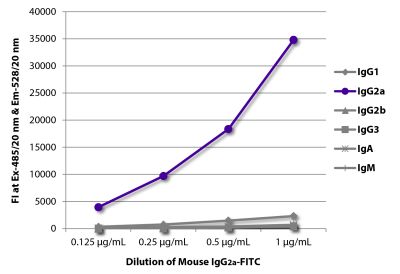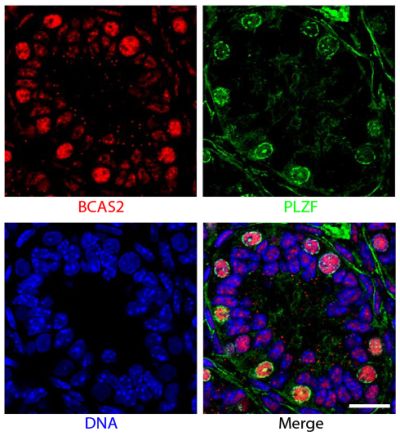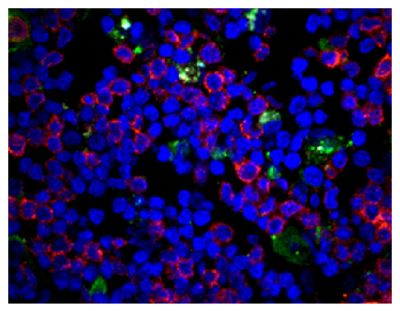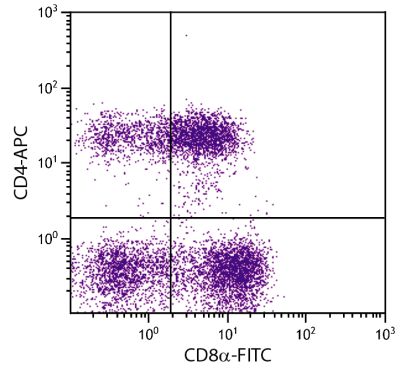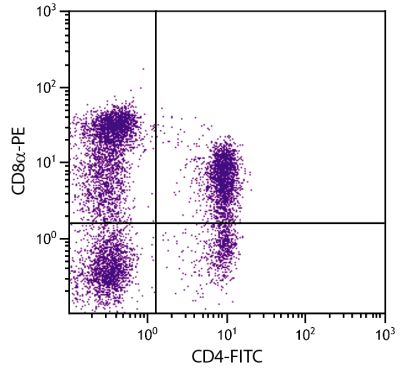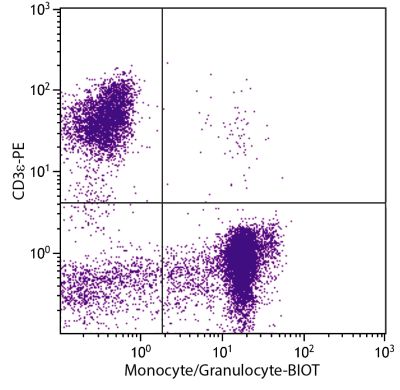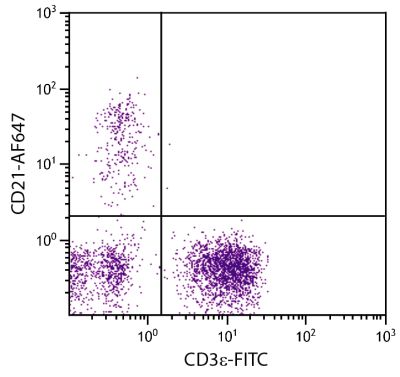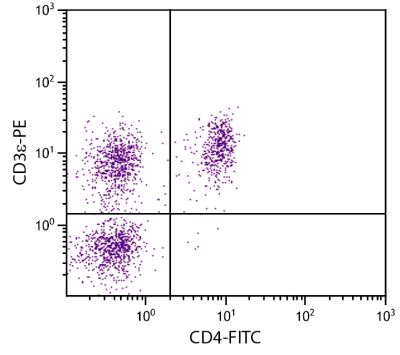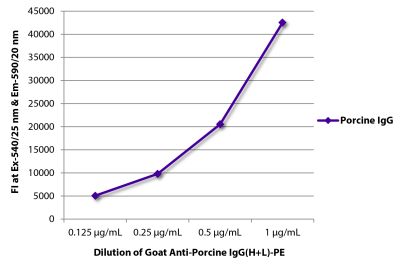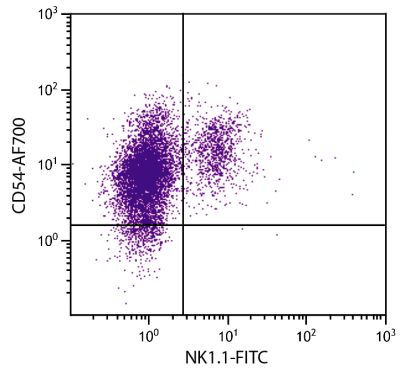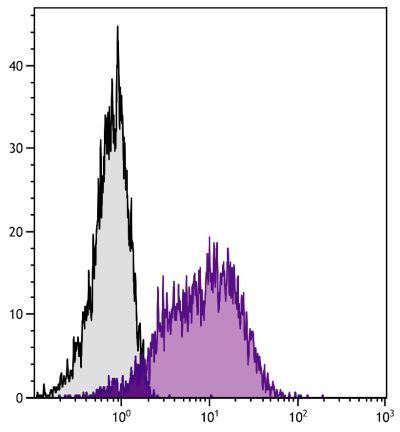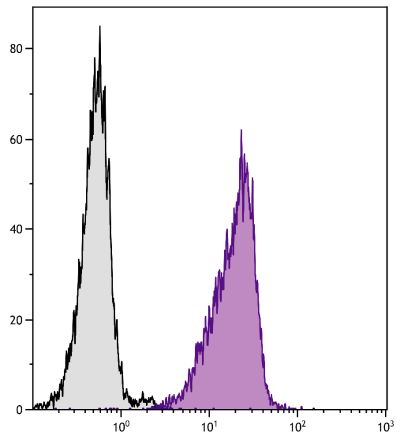Mouse Anti-Porcine CD1-FITC (76-7-4)
Cat. No.:
4500-02
FITC Anti-Porcine CD1 for use in flow cytometry and immunohistochemistry / immunocytochemistry assays.
$434.00
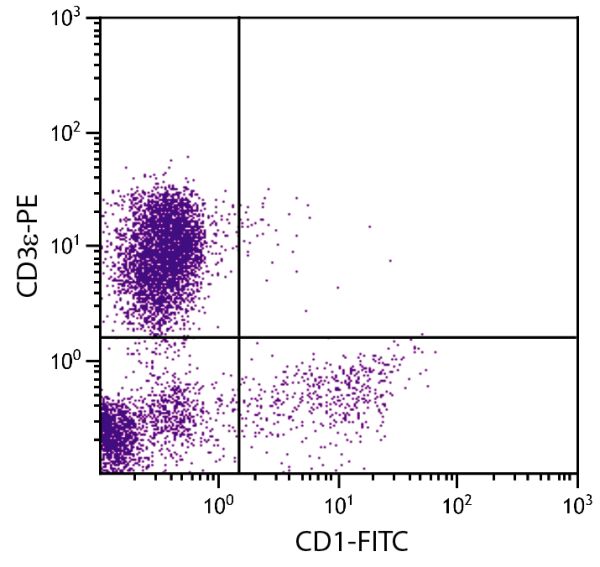

| Clone | 76-7-4 |
|---|---|
| Isotype | Mouse (BALB/c) IgG2aκ |
| Isotype Control | Mouse IgG2a-FITC (HOPC-1) |
| Specificity | Porcine CD1 |
| Alternative Names | CD1c, CD1.1 |
| Description | Porcine CD1 is a type I transmembrane glycoprotein and a member of the immunoglobulin superfamily of cell surface receptors. It has a domain organization similar to that of MHC class I molecules and is expressed in association with β2-microglobulin. CD1 is found on B cells, macrophages, and immature thymocytes. There is evidence for a role of CD1 in presentation of lipids and peptides to T cells. |
| Immunogen | Fresh dd miniature swine thymocytes |
| Conjugate | FITC (Fluorescein) |
| Buffer Formulation | Phosphate buffered saline containing < 0.1% sodium azide |
| Clonality | Monoclonal |
| Concentration | 0.5 mg/mL |
| Volume | 1.0 mL |
| Recommended Storage | 2-8°C; Avoid exposure to light |
| Applications |
Flow Cytometry – Quality tested 1,2,5,7-11 Immunohistochemistry-Frozen Sections – Reported in literature 2-6 Immunocytochemistry – Reported in literature 7 Immunoprecipitation – Reported in literature 1 Complement Mediated Cell Depletion – Reported in literature 1 |
| RRID Number | AB_2796009 |
| Gene ID |
100124526 (Porcine) |
| Gene ID Symbol |
CD1D (Porcine) |
| Gene ID Aliases | CD1 |
Documentation
Certificate of Analysis Lookup
Enter the Catalog Number and Lot Number for the Certificate of Analysis you wish to view
- 1. Pescovitz MD, Lunney JK, Sachs DH. Preparation and characterization of monoclonal antibodies reactive with porcine PBL. J Immunol. 1984;133:368-375. (Immunogen, FC, IP, CMDC)
- 2. Denham S, Zwart RJ, Whittall JT, Pampusch M, Corteyn AH, Bianchi AT, et al. Monoclonal antibodies putatively identifying porcine B cells. Vet Immunol Immunopathol. 1998;60:317-28. (IHC-FS, FC)
- 3. Pauly T, König M, Thiel H, Saalmüller A. Infection with classical swine fever virus: effects on phenotype and immune responsiveness of porcine T lymphocytes. J Gen Virol. 1998;79:31-40. (IHC-FS)
- 4. Yamada K, Shimizu A, Ierino FL, Utsugi R, Barth RN, Esnaola N, et al. Thymic transplantation in miniature swine. I. Development and function of the "thymokidney". Transplantation. 1999;68:1684-92. (IHC-FS)
- 5. Diaz-San Segundo F, Moraes MP, de Los Santos T, Dias CC, Grubman MJ. Interferon-induced protection against foot-and-mouth disease virus infection correlates with enhanced tissue-specific innate immune cell infiltration and interferon-stimulated gene expression. J Virol. 2010;84:2063-77. (IHC-FS, FC)
- 6. Debeer S, Le Luduec J, Kaiserlian D, Laurent P, Nicolas JF, Dubois B, et al. Comparative histology and immunohistochemistry of porcine versus human skin. Eur J Dermatol. 2013;23:456-66. (IHC-FS)
- 7. Nfon CK, Dawson H, Toka FN, Golde WT. Langerhans cells in porcine skin. Vet Immunol Immunopathol. 2008;126:236-47. (ICC, FC)
- 8. Layton DS, Bean AG, Dodge NM, Strom AD, Sandrin MS, Ierino FL. Differential cytokine expression and regulation of human anti-pig xenogeneic responses by modified porcine dendritic cells. Xenotransplantation. 2008;15:257-67. (FC)
- 9. Facci MR, Auray G, Buchanan R, van Kessel J, Thompson DR, Mackenzie-Dyck S, et al. A comparison between isolated blood dendritic cells and monocyte-derived dendritic cells in pigs. Immunology. 2010;129:396-405. (FC)
- 10. Chen L, Dong X, Shen H, Zhao M, Ju C, Yi L, et al. Classical swine fever virus suppresses maturation and modulates functions of monocyte-derived dendritic cells without activating nuclear factor kappa B. Res Vet Sci. 2012;93:529-37. (FC)
- 11. Leclercq C, Prunier A, Thomas F, Merlot E. Neonatal surgical castration of male pigs reduces thymic growth but has moderate consequences on thymocytes. J Anim Sci. 2014;92:2415-21. (FC)
See More


